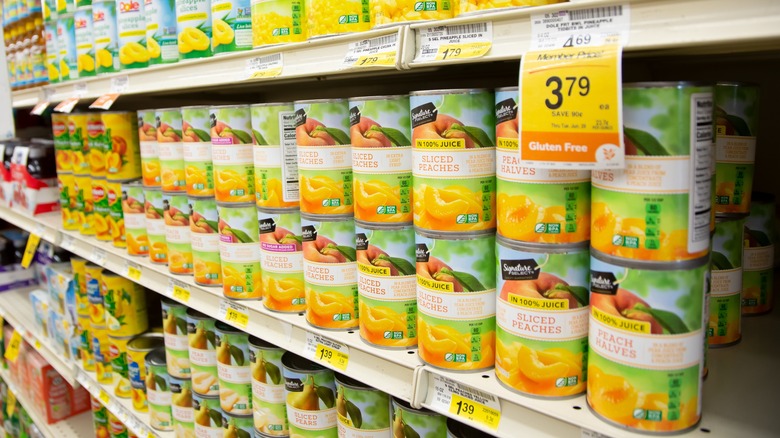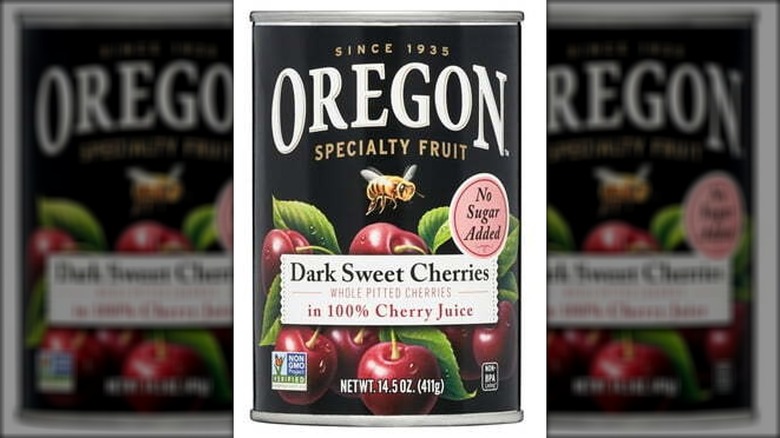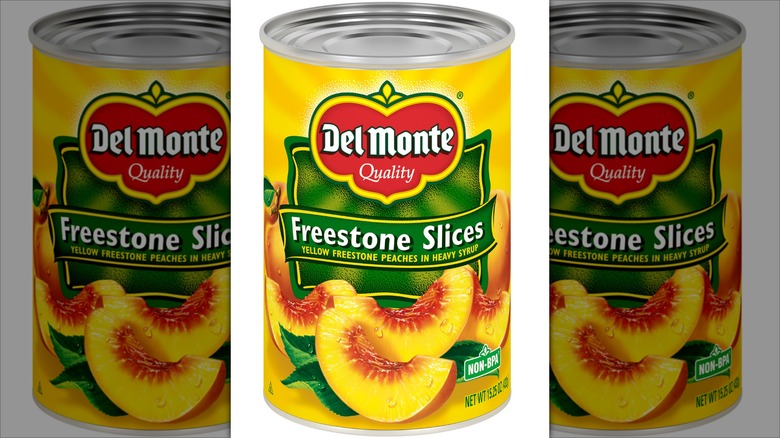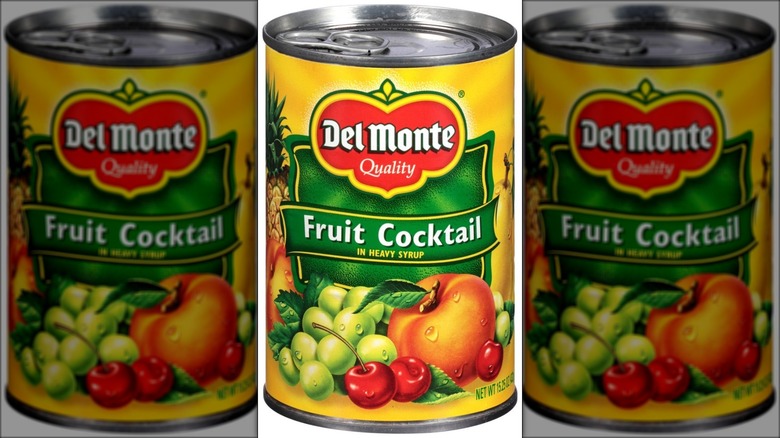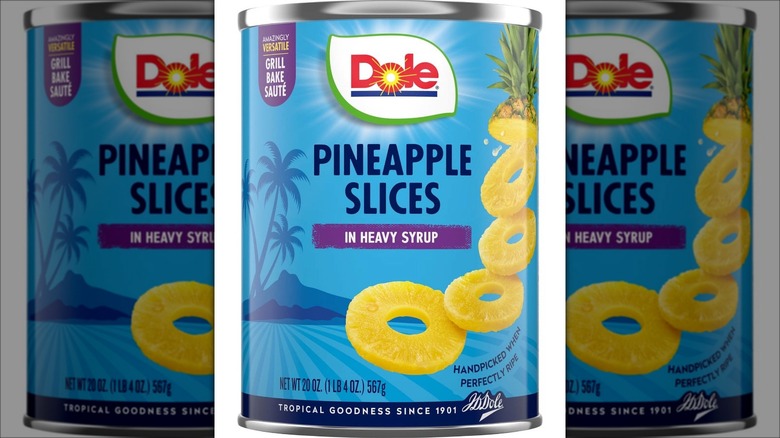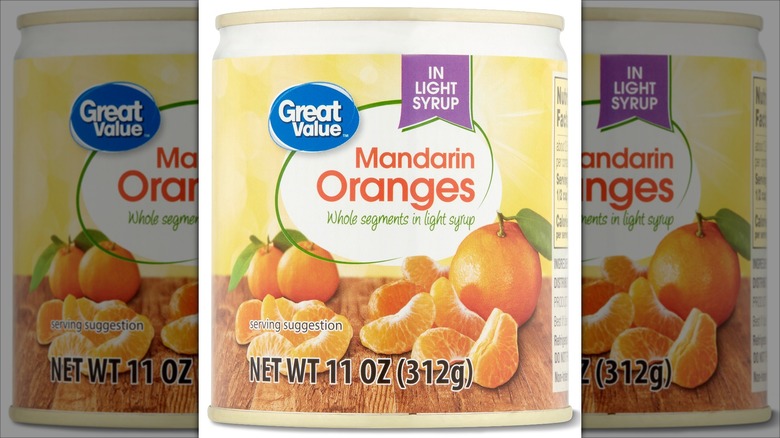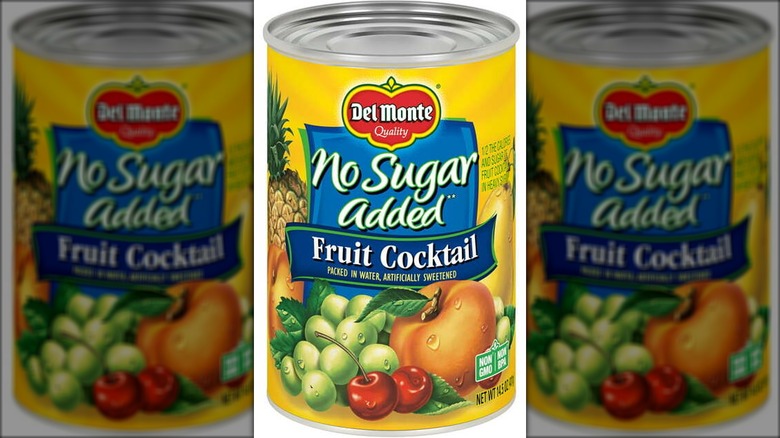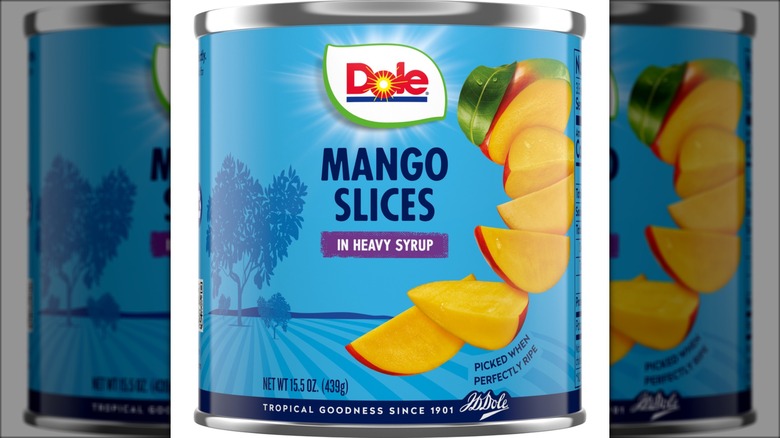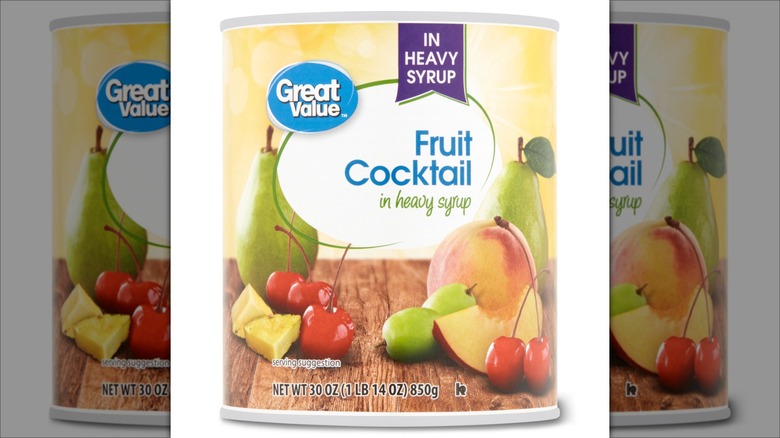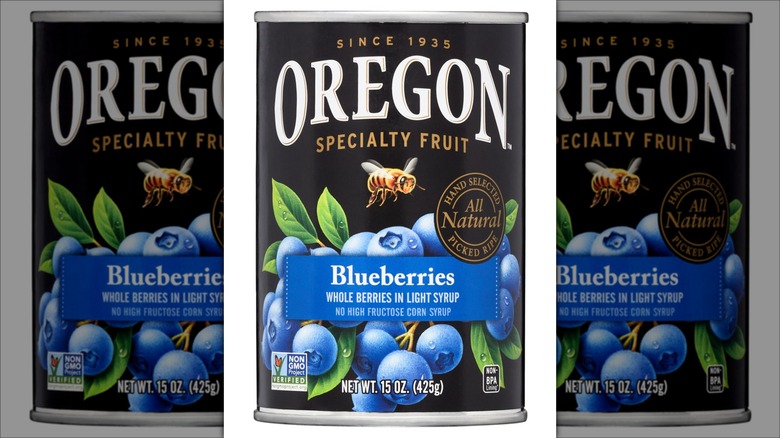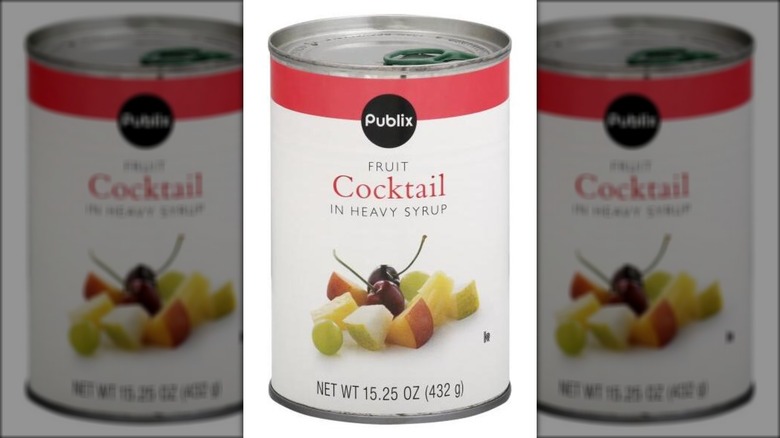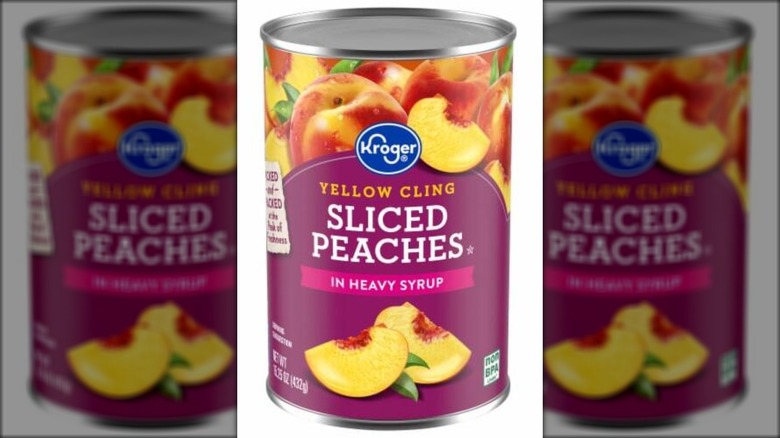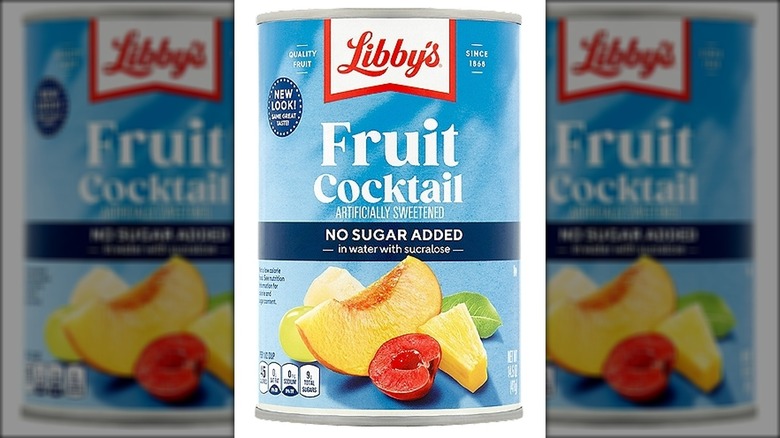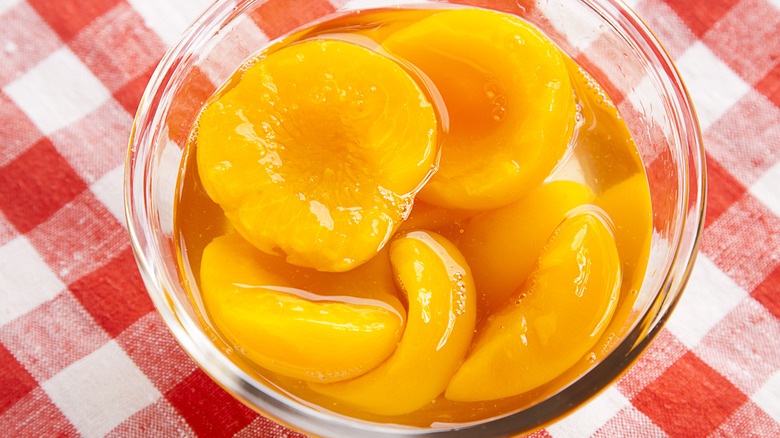12 Unhealthiest Canned Fruits
We may receive a commission on purchases made from links.
Canned fruit can't be unhealthy — can it? Actually, it can. And no, we aren't talking about the natural sugars that you'll find in fruit. Added sugars, high fructose corn syrup, artificial coloring, and more abound when it comes to these seemingly healthy grabs, and it's high time you know about it.
In this post, we'll bust the myth that all types of canned fruit are healthy by letting you know which to avoid. We'll share the details brand by brand, highlighting what exactly makes each particular canned fruit option risky so you'll know what to skip out on. We'll also share some of our secrets for copping the best options for canned fruit so you can still enjoy a quick and easy snack without all the potentially unhealthy ingredients associated with it.
So without further ado, let's dive into the juicy details of the unhealthiest canned fruits on the market.
1. Oregon Dark Sweet Cherries in Heavy Syrup
Oregon Fruit is featured with an attractively sophisticated dark label that would lead you to believe the fruit within is a step above the rest. However, despite its distinct appearance, the fruit is actually chock-full of added sugar, making it one of the unhealthiest canned fruit grabs you can get your hands on.
In this case, Oregon Dark Sweet Cherries in Heavy Syrup contain about 13 grams of added sugar per ½ cup. Though there's plenty of sugar in the can, you at least won't see high-fructose corn syrup here, according to the label's ingredients. What you will find, however, is that the entire 15-ounce can of these cherries in heavy syrup will run you about 39 grams of added sugar. Also, although it is totally common for fruit to contain carbohydrates, the carb content in Oregon Fruit dark cherries in heavy syrup is particularly high at 32 grams per ½ cup and 96 carbs per can.
2. Del Monte Yellow Sliced Peaches in Heavy Syrup
Can't get enough juicy canned peaches? They are delish, aren't they? The thing is, canned peaches taste just as good in 100% juice as they do in heavy syrup. Taking the latter route, unfortunately, has dire consequences, as some brands, like Del Monte Freestone Sliced Peaches in Heavy Syrup, contain an awful amount of sugar and even feature high-fructose corn syrup.
Del Monte Freestone Peaches in Heavy Syrup contain 15 grams of added sugar per ½ cup, meaning that consuming the entire 15.25-ounce can is going to get you 52.5 grams of added sugar in total. Yeah, you'll get the benefits of eating "peaches," but when doused in all the syrup, these benefits get overshadowed by the threat of consuming too much refined sugar.
On top of regular sugar woes, you'll also need to worry about risks associated with consuming too much high-fructose corn syrup. High fructose corn syrup is known to bolster obesity in some individuals and may lead to problems with inflammation and fatty liver disease, according to the Cleveland Clinic. With these facts in mind, it's probably best to skip the heavy syrup if you're in the mood for Del Monte peaches — try grabbing the naturally sweetened varieties instead.
3. Del Monte Fruit Cocktail in Heavy Syrup
Remember the fruit cocktail they used to scoop onto your plate in elementary school? Good times.
In the case of Del Monte Fruit Cocktail in Heavy Syrup , this canned fruit not only contains sugar and high-fructose corn syrup, but contains controversial red dye as well. Starting with the sugar content, expect to get a heaping dose of it at 14 grams of added sugar per ½-cup serving, translating to 49 grams of added sugar in the entire 15.25-ounce can. Of course, there's usually high-fructose corn syrup to worry about when it comes to Del Monte, and in this case, you can expect to have it clinging to your mixed fruit if you choose to eat from this can.
Last, let's not forget the fact that Del Monte Fruit Cocktail contains red dye. Granted, it's only to make the cherries brighter, but other brands, including Great Value, resort to the use of less threatening carmine for its color, while Del Monte uses Red No. 3. Red No. 3 has been associated with the potential to increase risks for cancer and also behavior issues in small children, according to Consumer Reports. It's also banned from use in cosmetics by the FDA, yet it still crops up in food, which many consumers (and scientists) find a major concern. All in all, it may be best to simply steer clear of Del Monte Fruit Cocktail in Heavy Syrup — the risks may not be worth it.
4. Dole Pineapple Slices in Heavy Syrup
This one's a heavy hitter in the sugar department, so much so that it made us do a double-take. Though most fruits contained in heavy syrup will pack a sugary punch, this one takes the cake in terms of portions. Dole Pineapple Slices in Heavy Syrup sport as much as 13 grams of added sugar per two slices of pineapple. This means that eating even four slices will cost you 23 grams of sugar, which is more sugar than a baked apple pie from McDonald's (which contains 13 grams of added sugar).
Oh, and get this. Despite there already being a ton of sugar in only two slices of Dole pineapple in heavy syrup, there are also five flippin' servings of it in the can, meaning that consuming the whole can would run about 65 grams of added sugar. The horror!
Still, although there's a ton of sugar in Dole pineapple, there's one thing we didn't find in the can: high-fructose corn syrup and artificial dye. And while we wouldn't expect dye to be in the can (this is usually reserved for canned fruit containing cherries), we were pleasantly surprised to see that the pineapples were at least sweetened with regular sugar. Either way, added sugar is added sugar, and getting too much of it can cause unsavory consequences like diabetes, inflammation, and more, according to Harvard Health Publishing. Skip it if you can!
5. Great Value Whole Mandarin Oranges in Light Syrup
Yummy, sweet, and slightly tangy, what could be so bad about mandarin oranges in a little light syrup, right? Well ... you'd be surprised. Though the "light" label on canned fruit can certainly seem promising, the truth is that canned fruits doused in light syrup can often contain just as much sugar as heavy syrup prototypes.
Great Value Whole Mandarin Oranges in Light Syrup illustrates this perfectly. The nutrition facts here state that there are 11 grams of added sugar per ½ cup. The whole can render 27.5 grams, putting you at risk of topping your previously mentioned AHA added sugar intake for the day if you're particularly hungry. Maybe it's just us, but that's not exactly what comes to mind when we think of "light." This is a measly 2 grams of sugar shy of what most canned fruits in heavy syrup feature on average, and thus, doesn't seem like much of a distinction, honestly. We are at least happy to report that there isn't high fructose corn syrup in the can, so for that, we're grateful. Still, there are better options out there, such as mandarin oranges sold in 100% juice.
6. Del Monte No Sugar Added Canned Mixed Fruit Cocktail
This one might be a bit of a shocker, but stick with us, we're going somewhere. Although no-sugar-added canned fruit might seem like a novel idea considering all the sugary options out there, the truth is that if the fruit is sweetened with artificial sweetener, it might not actually be such a noble grab. Take Del Monte No Sugar Added Fruit Cocktail, for example. It contains sucralose causing the fruit to render 0 grams of added sugar, unlike the sugary grabs we've mentioned before. Cool, right?
Actually, we aren't so sure. Although sucralose crops up in many foods and drinks these days, the truth is that there is some concern that this risky sugar substitute could have some harmful effects on human health. According to Medical News Today, research shows that some forms of sucralose may cause damage to DNA. It may also lead to gut damage and could even increase risks for cancer. Doesn't sound like a sweet deal to us!
In addition to sucralose in Del Monte No Sugar Added Fruit Cocktail, you'll also see something called acesulfame potassium. This is yet another type of artificial sweetener and is sometimes referred to as "Ace-K," according to Medical News Today. And though this sweetener is FDA-approved and considered safe, there are some who believe further studies should be conducted to confirm that the consumption of Ace-K is indeed safe for everybody.
7. Dole Mango Slices in Heavy Syrup
This is another one where you'll need to watch portion sizes, since the added sugar in these is once again measured by slices instead of by cups. Dole Mango Slices in Heavy Syrup certainly are heavy when it comes to the amount of sugar contained inside. Every two to three slices are said to contain as much as 15 grams of added sugar, meaning they potentially contain even more sugar per portion than the previously mentioned Dole pineapples. This is a real shame since mangoes taste absolutely delicious, right? For reference, the American Heart Association recommends that men and women get no more than 25-36 grams of added sugar daily, meaning even a couple of servings of these mangoes would cause you to meet your max for the day quite quickly.
On the bright side, like with the pineapples, Dole has at least chosen to spare us the high-fructose corn syrup. Still, expect to get around 75 grams of added sugar in a can of Dole mango slices, making this one of the sugariest canned fruit products we've come across.
8. Great Value Fruit Cocktail in Heavy Syrup
Earlier we mentioned the Great Value brand for its use of carmine instead of Red No. 3 in its fruit cocktail, and indeed, it appears to be a better option for coloring in terms of health. Still, that doesn't designate Great Value Fruit Cocktail in Heavy Syrup as a healthy canned fruit grab. On the contrary, this can of mixed fruit contains 10 grams of added sugar per ½ cup, leading to about 35 grams of added sugar total per 15.25-ounce can. On top of that, you'll get your dose of high-fructose corn syrup here too, meaning that consuming a lot of this fruit over time may lead to those issues detailed earlier in the post related to fat and disease.
Also, we'll go ahead and address the elephant in the room: Although Great Value Fruit Cocktail in Heavy Syrup contains 10 grams of added sugar per serving along with high-fructose corn syrup, it also seems to be one of the canned fruits with the least amount of sugar per serving. Touché. Nevertheless, added sugar is still added sugar, and though it is a lesser amount of added sugar per serving than the other types of canned fruit featured thus far, it still doesn't make it good for you, especially when there are canned fruits in 100% fruit juice available for sale. At the end of the day, Great Value canned fruit in heavy syrup just isn't a healthy choice.
9. Oregon Blueberries in Heavy Syrup
This is another undoubtedly yummy but no less unhealthy canned fruit option from Oregon Fruits. This time, we'll evaluate the canned blueberries from the brand. As before, the brand clearly advertises no high-fructose sugar in the mix, so there are no worries there. Still, there are 10 grams of sugar per ½ cup, meaning the entire can renders 30 grams. And though you might not eat an entire can of blueberries, the added sugar is still worth noting, especially because eating fresh blueberries would be far healthier.
Granted, canned blueberries may not be something you'd use on their own like you would with other fruits. Sure, you could enjoy these blueberries à la carte, but it is far more feasible to use these sweetened berries over ice cream, in a cobbler, or baked in some other decadent treat. In these cases, the added sugar may not be as much of a concern. Still, it's good to stay informed, especially if you aren't familiar with sneaky sugars that make their way into canned fruit.
10. Publix Fruit Cocktail in Heavy Syrup
Diced peaches, pears, grapes, and more constitute Publix canned fruit in heavy syrup, but there's a lot more to this "cocktail" than what meets the eye. Like so many other canned fruits on this list, Publix's generic brand of canned fruit cocktails gets low marks because of the unnecessary added ingredients lurking inside. And while some of the previously mentioned canned fruits only contain traditional added sugar, this Publix fruit cocktail, like the canned fruit featured from Dole and other brands, features that oh-so-annoying high-fructose corn syrup in every canned concoction.
To be specific, you can expect to get 10 grams of sugar per every ½ cup of Publix Fruit Cocktail in Heavy Syrup. This translates to 35 grams of added sugar per can. And while this total may be lower than some of the other heavy hitters on the list, we still can't justify adding traditional sugar, let alone high-fructose corn syrup, to fruit like this. It just seems so unnecessary, especially considering that you can cop Publix Fruit Cocktail in 100% juice without a single gram of sugar (or artificial sweetener) added. Now that's sweet.
11. Kroger Sliced Peaches in Heavy Syrup
Canned yellow cling peaches could work well in a peach pie (though we always suggest fresh peaches for that), but they're not our top choice for a "healthy" snack. Indeed, the Kroger Canned Yellow Cling Peaches hop on the bandwagon in terms of troubling ingredients and the product definitely doesn't lend itself to a healthy lifestyle the way it might seem.
As we've highlighted throughout this post, fruits labeled as "in heavy syrup" can negatively impact your health, especially when additives like high-fructose corn syrup are involved. In this case, expect to incur 12 grams of added sugar per every ½ cup, with 42 grams of added sugar in the entire can. And because peaches tend to get sliced thick, it would be pretty easy to exceed that ½-cup serving size once or twice over.
Sigh. Yet another canned fruit unnecessarily drenched in added sugar.
12. Libby's Fruit Cocktail in Water with Sucralose
Last but not least, you may have seen Libby's Fruit Cocktail in Water with Sucralose at your local Shoprite or other retailer. Honestly, this sounds like a breath of fresh air after the high sugar totals we've come across in this post, but as we've already mentioned, things get a bit dicey when we're talking about artificial sweeteners, with sucralose now in the line of fire for being particularly unhealthy.
As we've already discussed, sucralose has been under attack for potentially increasing the risk of cancer and damaging DNA in some individuals, according to Healthline. And though this doesn't mean you'll instantly experience ill effects if you down a can or two of sucralose-sweetened fruit cocktails, it does mean it's something you'll want to watch out for, despite its seemingly promising description. At the end of the day, if you're looking for the healthiest option, either go for fresh fruit or buy canned fruit in 100% juice. Sucralose-sweetened fruit might not be the alternative you're looking for in terms of good health.
Methodology
We determined the unhealthiest canned fruit by carefully examining the ingredients and nutrition facts labels on popular canned fruit items. Canned fruits containing a very high amount of added sugar and/or high-fructose corn syrup, artificial food coloring, or sucralose were considered part of our unhealthy ruling. Of course, not all the ingredients mentioned here will bother everyone, and if that's you, you're entitled to your own opinion. We did our best to present information as factually as possible, but the decision on what or what not to consume is completely up to you.
